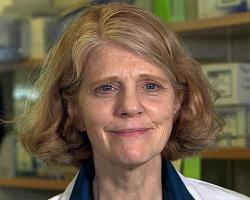April 24, 2018
The work of a UMass Amherst environmental toxicologist and an air quality scientist are featured in two new "Research That Matters" videos released this week by the University’s Center for Agriculture, Food and the Environment (CAFE). CAFE director Jody Jellison says, “Meaningful research being conducted at UMass that impacts our lives in positive ways is of great interest to the public. These short videos, with links to more information, are intended to get the word out.”
Can Fruits and Vegetables Help Prevent Breast Cancer?
Can consumption of fruits and vegetables help reduce the risk of breast cancer? Kathleen Arcaro, environmental toxicologist in the University’s Department of Veterinary and Animal Sciences, along with colleagues in nutrition and epidemiology, thinks it can. She is studying young women who are breastfeeding for signs of inflammation that can signal cancer risk. Arcaro says, “We are looking for a link between increased levels of a very helpful, normally-occurring hormone in breast milk and increased consumption of fruits and vegetables.”
In a pilot study, she recommended eating a wide variety of darkly-pigmented vegetables and asked the women to eat in color categories—orange, yellow, red and green. A trained nutrition counselor provided fresh produce to five women for 12 weeks along with recipes. The women provided samples of their breast milk. It turns out that the good, healthy levels of the hormone did go up as consumption of fresh fruits and vegetables increased. A long-term research study is now under way at the UMass Amherst Life Sciences Laboratory. This laboratory encourages and enables colleagues and students from all scientific disciplines to work together to find solutions from many different angles.
View "More Veggies, Less Breast Cancer?" video
Can Wood Smoke From Pellet Stoves Harm Our Health?
New technology, in the form of pellets made of compressed wood, make modern wood heating much more convenient. But can this wood smoke harm our health? Rick Peltier of UMass Amherst’s Department of Environmental Health Sciences, is working to make sure we make smart energy choices about the types of fuel we use to keep warm, choices that will also that protect human health.
Peltier says, “Most adults take around 20,000 breaths per day. In each breath, we inhale hundreds or thousands of different particles, and some of these particles can make us quite sick. Poor air quality is linked to the premature death of more than eight million people worldwide; in the US, more people die of air pollution than they do from car accidents.”
With support from UMass Clean Energy Extension, he is monitoring air from a mobile air quality sampling laboratory, measuring the particulates found in the air. These data will be able to show whether or not pellet emissions could be harmful for a community. And knowing this information is important for policy makers, industry leaders, scientists, and families.
View "Wood Pellets and Our Health" video
UMass Extension is the Massachusetts partner in the national Cooperative Extension System, a public university network of outreach educational units linked through its federal partner, the National Institute of Food and Agriculture at the U.S. Department of Agriculture. In Massachusetts, Extension education began at Massachusetts Agricultural College, predecessor of UMass Amherst, in 1911 and was formalized at the national level in 1914. Today, UMass Extension has programs in agriculture and commercial horticulture, 4-H youth development, clean energy, and nutrition education. It also supports work in water resources, environmental conservation, food science and food safety.
